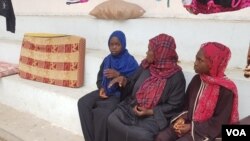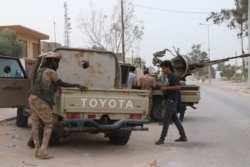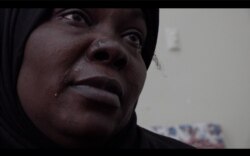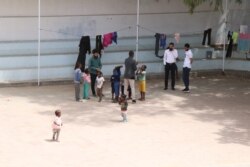Alaweiah was pregnant when she fled Sudan last year.
Her home in Darfur had been burned to the ground three times and her husband, Ahmed, decided they should try for a future in Europe. Now she lives in Tripoli among thousands of other travelers trying to catch a boat across the sea.
Surviving the journey, she said, has been almost unbearable.
So far this year, nearly 40,000 people have tried to cross the Mediterranean Sea to get to Europe from countries across the Middle East, Africa and beyond. Only a few thousand have reached their destination, and more than 550 people have drowned at sea, according to the International Organization for Migration.
But after making it to Tripoli with her three children and fleeing the brutal battles on the city's outskirts that have displaced 80,000 people, Alaweiah says the dangerous sea voyage will be easy in comparison — if she can come up with the money to pay for it.
"If I could travel today, I would," Alaweiah told us in an urban shelter for families displaced by the conflict in Libya. "It's more dangerous here than inside the sea itself."
Arrest, atrocities
Like many people fleeing wars, extreme poverty and other disasters, Alaweiah traveled with her husband and two children into the Libyan desert on their way to the northern coast, one of the world's most well-trodden migrant routes.
Soon after they crossed the border, militants imprisoned them, beat her husband and stole their money. Alaweiah was raped multiple times, and miscarried her then four-month-old pregnancy.
"Sometimes when they raped me, they forced my husband to watch," she said. "It broke my heart."
The family escaped the prison when clashes broke out among the militants. She was pregnant again, but the father was one of her rapists. Her husband was furious.
"He told me to get rid of the baby or forget about him in my life," she said. "But the baby is from God. I refused and he left."
After that, Alaweiah was left begging in the streets for months in Sabha, a volatile city in southern Libya. She didn't know if her husband intended to leave her permanently, or if he had been kidnapped or killed.
With no identity papers and almost no money, she eventually made it to Tripoli, where there is a little bit of humanitarian aid available. But for Alaweiah, it was not nearly enough. When she went to the hospital to give birth, doctors told her she needed a Cesarean section. But she also needed either money or papers from United Nations officials to get it — neither of which were available to her at the time.
"They kicked me out of the hospital," she said. "I couldn't stand or walk. Some men created a hidden space with their cars for me to give birth. I gave birth like a street dog."
Nowhere to go
Almost six months after Alaweiah's son was born, she was settled in Tripoli, with a small income from cleaning houses and a rented home.
But in April, war broke out after eastern forces declared their intention to take the Libyan capital by force.
"The battle was so close we could see mortars dropping outside of the house," she said. "This is not something we heard. We saw it."
Two and half months later, battles continue but neither side appears to be winning.
And the once again, displaced people like Alaweiah remain displaced.
"Now I am alone taking care of the children," she said. "I don't even have identification papers."











